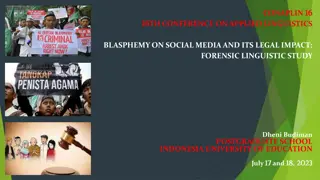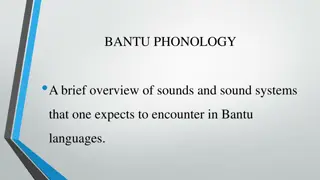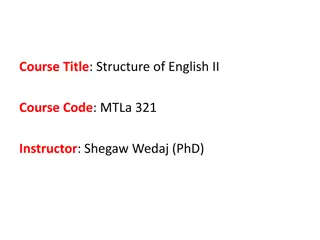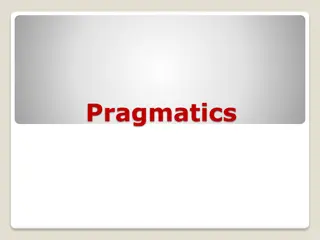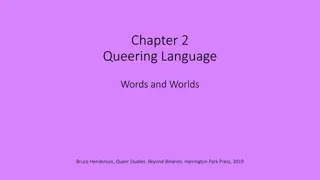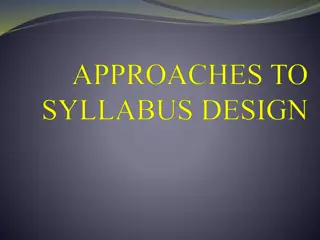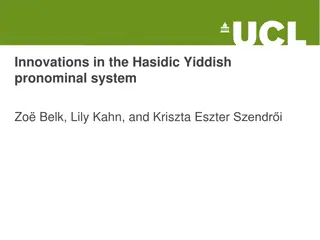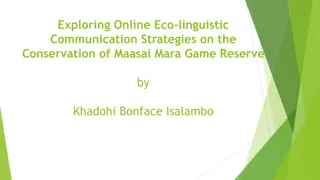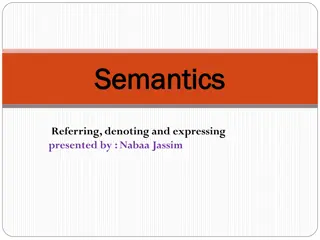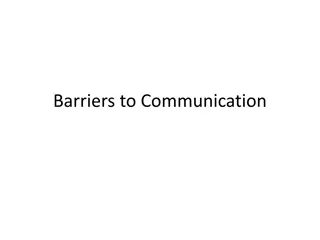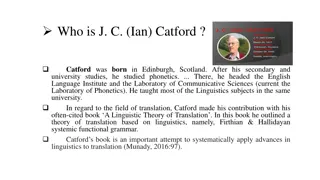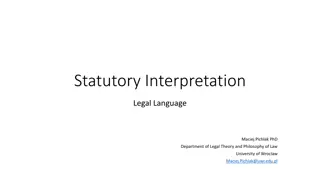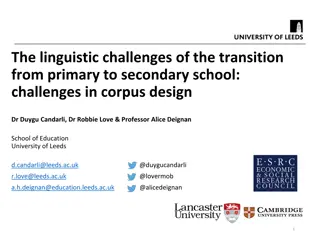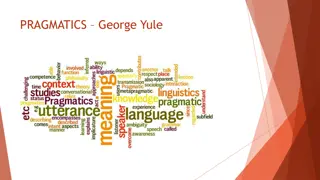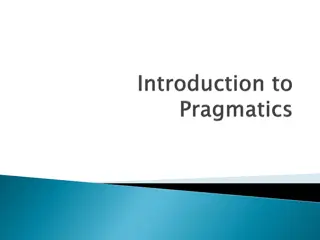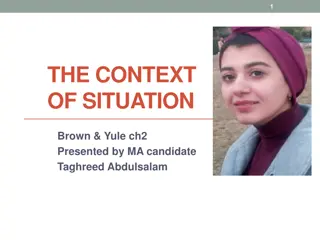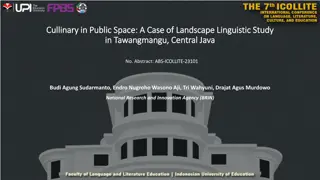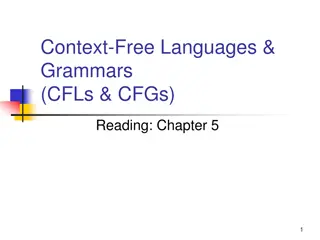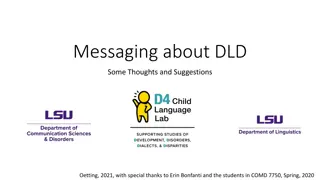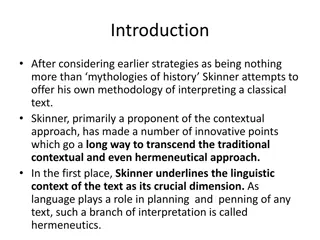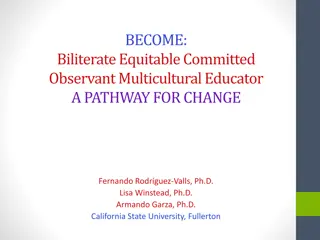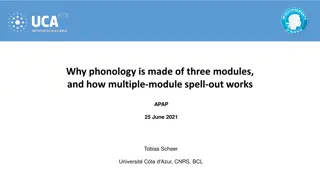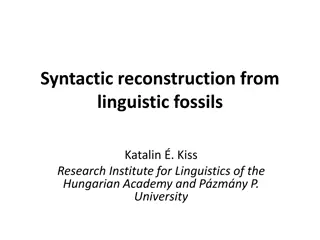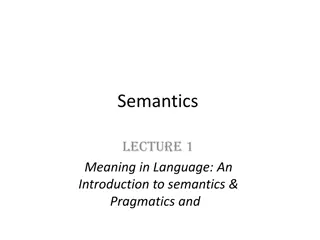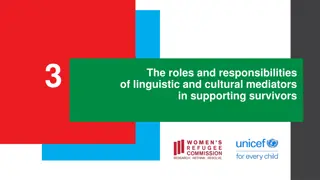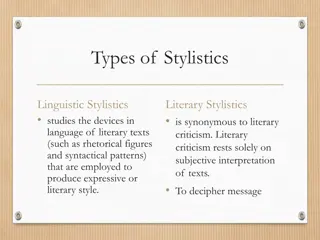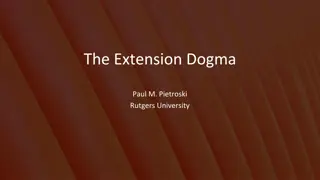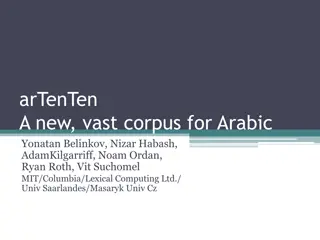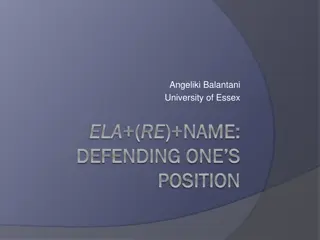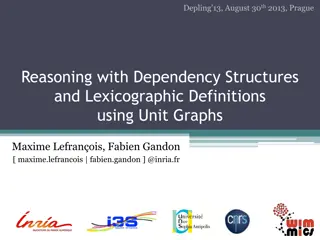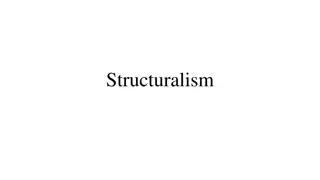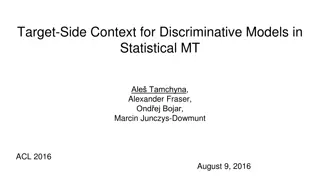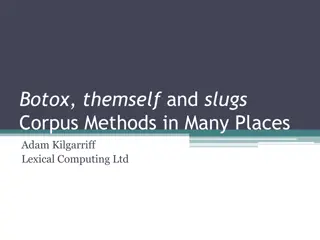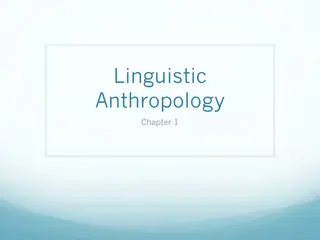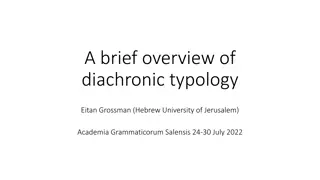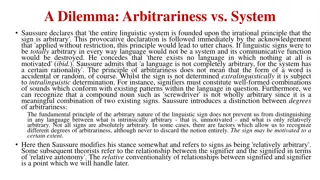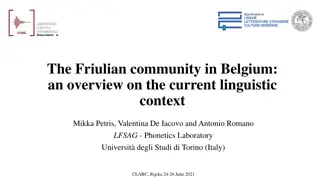Impact of Blasphemy on Social Media: Forensic Linguistic Analysis
Language plays a crucial role in human communication, especially on social media platforms where public speech can have legal consequences. This research delves into the concept of blasphemy on social media and its legal implications, focusing on linguistic forensic study. It explores how language c
7 views • 24 slides
The Significance of Media in Language Learning
Media plays a crucial role in language learning by raising awareness of the ideology behind linguistic structures and providing valuable information on society and culture. Linguists are drawn to media language for research purposes and to understand its impact on language use and attitudes. Media s
12 views • 5 slides
Overview of Stilistik in Bachelor's Studies
Stilistik in a Bachelor's program covers theoretical basics, stylistic concepts, micro and macro stylistics, and key texts in the field. It explores stylistic analysis, linguistic disciplines, communication styles, and the impact of style on various forms of expression including everyday communicati
6 views • 63 slides
Exploring Bantu Phonology and Linguistic Classification
Delve into the intriguing world of Bantu phonology and linguistic classification, covering the diverse sounds and phonological processes found in Bantu languages. Discover the rich heritage of over 500 Bantu languages in sub-Saharan Africa, classified into zones and classes, shedding light on the fa
0 views • 38 slides
Understanding Structural Linguistics: An Exploration of Language and Signs
Delve into the intricate world of structural linguistics through an in-depth analysis of language components, linguistic signs, and the relationship between language and linguistics. Explore the concepts of syntagmatic vs. paradigmatic relations, linguistic signs as associations of sound and meaning
4 views • 62 slides
Exploring Pragmatics in Linguistics Studies
Pragmatics delves into the study of implied meanings and how we interpret language in various contexts. It focuses on understanding communication beyond explicit words and explores the invisible meanings conveyed through situational and linguistic contexts. Deixis, physical context, and linguistic c
0 views • 41 slides
Exploring Queer Language and World
Examining the linguistic aspects of queerness, this content delves into the history and evolution of terms like queer and homosexual. It discusses the reclaiming of queer identity, its association with leftist politics, and the linguistic reclamation process. Various perspectives on queer terminolog
0 views • 24 slides
Understanding Language Teaching Syllabus: Integration, Theory, and Approaches
Language Teaching Syllabus involves the integration of subject matter and linguistic elements, guided by theories of language and learning. Various approaches like Grammatical, Situational, Communicative, and Analytic are used to structure syllabi. Breaking language into parts aids in sequential lea
1 views • 28 slides
Innovations in Hasidic Yiddish Pronominal System
Explore the evolution of pronouns in the Hasidic Yiddish language system, showcasing simplifications and changes over time. The research delves into the linguistic characteristics of Hasidic Yiddish speakers in Stamford Hill, London, highlighting the influences of various Hasidic groups and geograph
1 views • 24 slides
Strategies for Online Eco-Linguistic Communication in Maasai Mara Conservation
Maasai Mara faces threats from human encroachment, prompting conservation efforts. This study explores online eco-linguistic strategies for engaging the public in conservation activities. The importance of language in online communication to achieve ecological harmony is highlighted, emphasizing eco
0 views • 17 slides
Understanding Semantics: Exploring Linguistic Meaning and Expression
Exploring the realm of semantics, this content delves into how language is used to refer, denote, and express concepts in the world. It discusses the importance of linguistic meaning, different approaches to studying it, and the distinction between denotational and cognitive semantics. By examining
0 views • 7 slides
Understanding and Overcoming Communication Barriers
Communication barriers, such as physical, linguistic, cultural, mechanical, organizational, and psychological factors, can hinder effective message transmission and understanding. Physical barriers like noise and environmental stress, linguistic barriers including language ambiguity and jargon, cult
0 views • 11 slides
Understanding J.C. Catford's Linguistic Theory of Equivalence in Translation
J.C. Catford, a prominent figure in translation studies, developed a theory of equivalence in translation based on functional linguistics. His work emphasizes the process of substituting text from one language to another, focusing on formal and textual equivalence. Catford's theory sheds light on ho
2 views • 12 slides
Exploring Meaning, Thought, and Reality in Linguistics
Delve into the fascinating realm of semantics and linguistic theories, where the interplay between language, thought, and reality is deciphered. Concepts like reference, denotation, and the relationship between linguistic expressions and the world are explored through the works of renowned linguists
0 views • 37 slides
Understanding Statutory Interpretation in Legal Context
Explore the intricacies of statutory interpretation, linguistic and non-linguistic methods, and types of interpretation in legal contexts. Uncover the significance of legal reasoning, historical perspectives, and comparisons between Anglo-Saxon and Continental legal cultures. Delve into the complexi
1 views • 17 slides
Challenges in Transition from Primary to Secondary School: Corpus Design
The linguistic challenges in transitioning from primary to secondary school in England are explored in this project. The focus is on academic school language and the barriers students face in understanding the curriculum, particularly at the start of Key Stage 3. The differing registers of academic
0 views • 28 slides
Overview of Pragmatics and Deixis According to George Yule
Pragmatics and Deixis are crucial aspects of language understanding, as explored by George Yule. Pragmatics focuses on the use of language in context, while Deixis involves pointing via language to convey meaning based on the immediate context. Deictic expressions play a significant role in face-to-
0 views • 19 slides
An Exploration of Linguistic Meaning: Semantics and Pragmatics
Delve into the realm of linguistic meaning through the lenses of semantics and pragmatics. Explore how words and phrases carry literal meanings, while language usage in social contexts creates both literal and nonliteral meanings. Uncover the intricate interplay between semantics, concerned with the
6 views • 70 slides
Understanding the Importance of Context in Linguistic Interpretation
Linguists have increasingly recognized the significance of context in interpreting sentences since the 1970s. Contextual features, as discussed by scholars like Firth, Hymes, and Lewis, play a crucial role in understanding utterances within specific social and communicative settings. Co-text and the
0 views • 14 slides
Cultural and Culinary Landscape in Tawangmangu, Central Java: A Linguistic Study
Exploring the culinary and cultural landscape of Tawangmangu, Central Java through a landscape linguistic study, revealing the unique multilingual and multicultural aspects of the region. The research delves into the coexistence of diverse languages and culinary traditions, highlighting the signific
0 views • 9 slides
Understanding Context-Free Languages and Grammars
Context-Free Languages and Grammars (CFLs & CFGs) are essential in theoretical computer science, providing a framework for recognizing non-regular languages. This content explores the distinction between regular and context-free languages, delves into the construction of language recognizers using c
0 views • 40 slides
Linguistic Microaggressions in Messaging about DLD: Thoughts and Suggestions
Linguistic microaggressions in the discourse surrounding Developmental Language Disorder (DLD) can perpetuate negative stereotypes and harm individuals. This content discusses the concept of linguistic microaggressions, explores the ambiguity in messaging about DLD, and highlights the importance of
3 views • 12 slides
Skinner's Innovative Approach to Textual Interpretation
Skinner's methodology in interpreting classical texts involves a focus on linguistic context, utilizing hermeneutics to uncover deeper meanings. Departing from traditional views, he emphasizes the importance of language and speech-act theory in understanding authorial intentions within broader socia
1 views • 20 slides
Culturally Responsive Biliteracy in Inclusive Education
Culturally responsive biliteracy in inclusive education emphasizes the importance of teaching in two languages, valuing diverse cultural and linguistic identities, and creating a participatory and inclusive classroom environment. Educators play a crucial role in fostering language development and ac
0 views • 12 slides
The Three Modules of Phonology and Multiple-Module Spell-Out Systems
Phonology is structured into three modules - Sonority, Laryngeal, and Place - each with its own vocabulary and skeleton for computation. These modules interact in multiple-module spell-out systems to map linguistic structures onto phonetic realizations. Sonority, involving the audibility of linguist
0 views • 67 slides
Syntactic Reconstruction from Linguistic Fossils in Uralic Languages
Linguistic fossils provide valuable insights for syntactic reconstruction in Uralic languages like Hungarian, Eastern Khanty, and Samoyedic. Through a case study, constraints on topical objects and grammatical systems are examined using linguistic fragments.
0 views • 34 slides
Introduction to Meaning in Language: Semantics & Pragmatics
Meaning in language is explored in this introductory lecture, covering aspects such as communication, semiotics, linguistic channels, and approaches to studying meaning. The process of encoding messages, signal transmission, noise interference, and decoding are discussed within the context of commun
0 views • 19 slides
Understanding the Roles of Linguistic and Cultural Mediators in Support Settings
Linguistic and Cultural Mediators play crucial roles in supporting survivors by facilitating communication, providing cultural context, and offering additional support beyond language interpretation. They serve as bridges between cultures, helping to convey information accurately while remaining imp
0 views • 39 slides
Understanding Linguistic and Literary Stylistics
Linguistic Stylistics explores devices in language of literary texts to create expressive styles. Literary criticism relies on subjective interpretation, while Stylistic Analysis in linguistics identifies patterns in speech and writing. This content delves into the phonological, graphological, and l
0 views • 17 slides
The Extension Dogma: Exploring Meaning and Extensions in Linguistic Expressions
The Extension Dogma challenges the assumption that linguistic expressions inherently possess meanings. Instead, it posits that expressions have extensions without necessary meanings that determine them. Theories of meaning should focus on the extensions of expressions, while psychological studies of
0 views • 30 slides
Introduction to arTenTen: A New Vast Corpus for Arabic Linguistic Processing
arTenTen is a new corpus for Arabic containing a vast array of text types, rich metadata, and clean linguistic processing capabilities. It offers a significant improvement over existing Arabic corpora, presenting a larger dataset with a variety of linguistic features. The corpus is fully processed,
0 views • 8 slides
Competitiveness and Epistemics in Interaction: A Linguistic Analysis
This linguistic analysis delves into the phenomena of imperative forms, assertion, disagreement, and the distribution of responsibilities in interactions. It explores the context of competitiveness and epistemics, emphasizing the participants' rights in describing and knowing information. The study
0 views • 13 slides
Reasoning with Dependency Structures and Lexicographic Definitions using Unit Graphs
This piece discusses the application of knowledge representation in addressing recurrent needs related to manipulating, querying, reasoning, and sharing information, particularly in the linguistic domain of Meaning-Text Theory. Maxime Lefrançois and Fabien Gandon explore formalisms, such as the the
0 views • 56 slides
Understanding Structuralism in Linguistics: An Overview
Structuralism emerged as a dominant approach in linguistic studies from the 1920s to the 1960s, led by figures like Ferdinand de Saussure. This philosophical perspective focused on the study of language as a stable system of signs, emphasizing the interrelation of mental representations of sounds an
1 views • 28 slides
Importance of Context in Statistical Machine Translation
Understanding the significance of context in machine translation is crucial for improving accuracy and disambiguating word sense. This research delves into the impact of target-side context for discriminative models in statistical machine translation, showcasing how context influences model performa
0 views • 29 slides
Understanding Linguistic Features in Trademarks and Branding
Explore the nuances of linguistic features in trademarks and branding through topics such as generic vs. name-like words, trade mark infringement cases, capitalization norms, and the significance of corpus analysis in understanding language usage in branding. Discover how linguistic expertise plays
0 views • 22 slides
Understanding Linguistic Anthropology and Anthropology: A Comprehensive Overview
Delve into the realm of linguistic anthropology and anthropology to explore the study of humans, culture, language, biology, artifacts, and more. Discover the four fields of anthropology, the holistic approach, and the importance of cultural relativism while avoiding ethnocentrism. Learn how linguis
0 views • 25 slides
Exploring Diachronic Typology and Linguistic Diversity
Delve into the fascinating realm of diachronic typology and linguistic properties across languages in time and space. Uncover the distribution of linguistic features, the past tense in various languages, and the underlying constraints shaping language structures. Discover the intricate interactions
0 views • 99 slides
The Principle of Arbitrariness in Linguistic Signs: Saussure's Insight
Saussure's declaration on the arbitrariness of linguistic signs is thought-provoking, emphasizing that while signs are arbitrary, complete arbitrariness would lead to chaos. He distinguishes between degrees of arbitrariness and acknowledges that signs are not entirely arbitrary, being subject to lin
0 views • 9 slides
The Friulian Community in Belgium: A Sociolinguistic Overview
The article presents the linguistic context of the Friulian community in Belgium, discussing historical background, emigration patterns, language transmission, and community cohesion. It explores the strong sense of ethnicity and identity that influences cultural and linguistic norms within the comm
0 views • 19 slides
